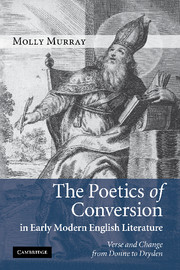Book contents
- Frontmatter
- Contents
- Acknowledgments
- Note on the text
- Introduction: toward a poetics of conversion
- 1 William Alabaster's lyric turn
- 2 John Donne and the language of de-nomination
- 3 Richard Crashaw and the gender of conversion
- 4 Versing and reversing in the poetry of John Dryden
- Afterword: Eliot's inheritance and the criticism of conversion
- Bibliography
- Index
3 - Richard Crashaw and the gender of conversion
Published online by Cambridge University Press: 04 August 2010
- Frontmatter
- Contents
- Acknowledgments
- Note on the text
- Introduction: toward a poetics of conversion
- 1 William Alabaster's lyric turn
- 2 John Donne and the language of de-nomination
- 3 Richard Crashaw and the gender of conversion
- 4 Versing and reversing in the poetry of John Dryden
- Afterword: Eliot's inheritance and the criticism of conversion
- Bibliography
- Index
Summary
In contrast to the studied obliquities of John Donne's poetry, Richard Crashaw's devotional hymns have generally been considered among the least reticent poems in the English language. Crashaw's combination of a highly emotional tone, a tendency to overflow the metaphoric measure, and a preoccupation with the experiences of female saints and martyrs has led centuries of critics to repeat two linked condemnations: that Crashaw has “bad taste” in both religion and aesthetics, and that his imagination is essentially “feminine.” This latter adjective has lately, and happily, begun to shed some of its pejorative critical connotations in Crashaw criticism. What persists, however, is a scholarly tendency to explain Crashaw's distinctly feminine preoccupations with reference to a particular devotional milieu. Maureen Sabine and Anthony Low, among others, see in his work a straightforward expression of Catholic devotional traditions, borrowing equally from medieval mysticism and from the humanisme dévot popular at the court of Charles I's Catholic queen, Henrietta Maria. More recently, Thomas Healy and Paul Parrish have attributed Crashaw's interest in women's religious experience to his early familiarity with the high-church Protestantism of Mary Collet's “Arminian nunnery” at Little Gidding. Such contextualizing accounts, however, can obscure an important function of feminine spiritual experience for Crashaw's poetry: such experience, as he represents it, can explicitly challenge or disrupt confessional boundaries. Indeed, Crashaw's “feminine” poetics invokes a specific discourse of conversion that, by the time of his poetry's composition in the 1630s, had become increasingly centered on Christian women.
- Type
- Chapter
- Information
- The Poetics of Conversion in Early Modern English LiteratureVerse and Change from Donne to Dryden, pp. 105 - 137Publisher: Cambridge University PressPrint publication year: 2009



